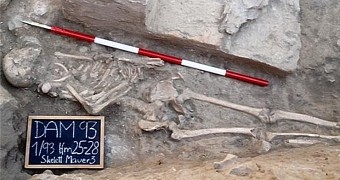This might come as a bit of a shock to those who claim it's impossible to be a vegetarian and stay physically fit, but as it turns out, Roman gladiators chiefly ate beans and grains and only feasted on meat once in a blue moon.
Needless to say, this vegetarian diet of theirs did nothing to impair their skills when it came to combat. On the contrary, it's safe to assume that, judging by the shows they would put on when in the ring, it suited them just fine.
What a person's bones say about their diet
Hoping to gain a better understanding of the long lost Roman gladiators' day-to-day life, researchers with the Medical University of Vienna and colleagues got to work analyzing the makeup of bones unearthed back in 1993 in present-day Turkey.
As detailed in a paper in the journal PLOS ONE, these bones were recovered from a gladiator cemetery that used to be part and parcel of the Roman city of Ephesos back in the 2nd or the 3rd century BC.
Based on this analysis of the makeup of the ancient gladiator bones, it was concluded that the Roman warriors chiefly ate beans, grains, and all sorts of fruit and vegetables. Although they were no strangers to meat, they only consumed it every once in a while.
Contrary to what some might assume, it appears that their diet was not all that different to that of the city of Ephesos' so-called civilian population. In fact, specialists say that the only likely difference was that the gladiators consumed grains of inferior quality.
Sports supplements in ancient times
What's interesting is that, by the looks of it, Roman gladiators used to drink plant ashes mixed with water on a regular basis. The Medical University of Vienna researchers and colleagues suspect that they thought of this concoction as a tonic.
“Plant ashes were evidently consumed to fortify the body after physical exertion and to promote better bone healing,” study leader Fabian Kanz with the University's Department of Forensic Medicine said in a statement.
“Things were similar then to what we do today – we take magnesium and calcium (in the form of effervescent tablets, for example) following physical exertion,” the researcher went on to comment on this discovery.
Due to the fact that they consumed plant ashes after training or after being involved in combat, the Roman gladiators whose remains were found in present day Turkey in 1993 had fairly elevated concentrations of strontium in their bones.
Since such concentrations were not documented in the bones of ordinary people that lived in Ephesos millennia ago, it safe to assume that gladiators were the only ones who relied on this concoction to stay in shape and ready for battle.

 14 DAY TRIAL //
14 DAY TRIAL //